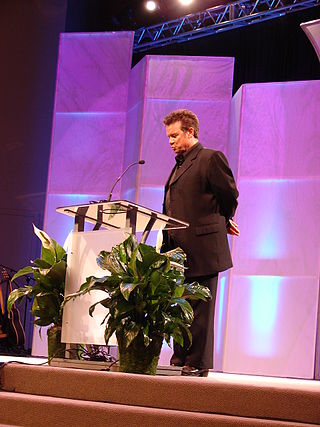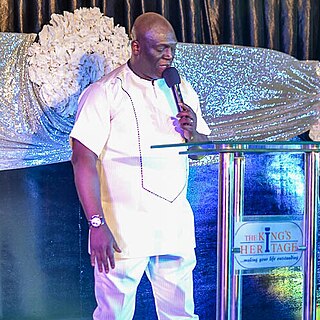Jonathan Wutawunashe is a songwriter, guitarist, keyboard player, and producer.
Jonathan Wutawunashe is a songwriter, guitarist, keyboard player, and producer.
As leader of the gospel group Family Singers, he was the first star of Zimbabwean gospel. [1] Wutawunashe produced, shot, and edited the music video for his wife Shuvai's hit "Nditorei". His family belongs to a megachurch called the Family of God Church. He was the second born in a family of five children. He has four siblings, Andrew, Erasmus, Edna, and Amos. His brother Andrew, referred to by church members as "Prophet," is the founder and leader of the church, which has branches all over the world.
Wutawunashe worked on African Praise, a praise medley for which he and Shuvai wrote many original songs. He has produced albums featuring up-and-coming artists, as well as Family Singers. Since 1994, he has shared his recording studio with other gospel artists. Wutawunashe launched Gospel Bandstand with his wife, a TV show showcasing new gospel talent.
Gospel music is a traditional genre of Christian music, and a cornerstone of Christian media. The creation, performance, significance, and even the definition of gospel music varies according to culture and social context. Gospel music is composed and performed for many purposes. Including aesthetic pleasure, religious or ceremonial purposes, and as an entertainment product for the marketplace. Gospel music is characterized by dominant vocals and strong use of harmony with Christian lyrics. Gospel music can be traced to the early 17th century.
Spirituals is a genre of Christian music that is associated with African Americans, which merged sub-Saharan African cultural heritage with the experiences of being held in bondage in slavery, at first during the transatlantic slave trade and for centuries afterwards, through the domestic slave trade. Spirituals encompass the "sing songs," work songs, and plantation songs that evolved into the blues and gospel songs in church. In the nineteenth century, the word "spirituals" referred to all these subcategories of folk songs. While they were often rooted in biblical stories, they also described the extreme hardships endured by African Americans who were enslaved from the 17th century until the 1860s, the emancipation altering mainly the nature of slavery for many. Many new derivative music genres emerged from the spirituals songcraft.

Zimbabwean music is heavily reliant on the use of instruments such as the mbira, Ngoma drums and hosho. Their music symbolizes much more than a simple rhythm, as the folk and pop style styled music was used as a symbol of hope for Zimbabweans looking to gain independence from Rhodesia. Music has played a significant role in the history of Zimbabwe, from a vital role in the traditional Bira ceremony used to call on ancestral spirits, to protest songs during the struggle for independence. The community in Zimbabwe used music to voice their resistance to their oppression, as one of the only weapons they had available to fight back with. In the eighties, the Music of Zimbabwe was at the center of the African Music scene thanks to genres such as Sungura and Jit. However, several performers were banned by state TV and radio leading to the closing of several music venues.

The South African music scene includes both popular (jive) and folk forms like Zulu isicathamiya singing and harmonic mbaqanga. Other popular genres are Marabi, Kwaito, house music, Isicathamiya, Gqom, rock music, hip hop and Amapiano.

Christian music is music that has been written to express either personal or a communal belief regarding Christian life and faith. Common themes of Christian music include praise, worship, penitence and lament, and its forms vary widely around the world. Church music, hymnals, gospel and worship music are a part of Christian media and also include contemporary Christian music which itself supports numerous Christian styles of music, including hip hop, rock, contemporary worship and urban contemporary gospel.

Andraé Edward Crouch was an American gospel singer, songwriter, arranger, record producer and pastor. Referred to as "the father of modern gospel music" by contemporary Christian and gospel music professionals, Crouch was known for his compositions "The Blood Will Never Lose Its Power", "My Tribute " and "Soon and Very Soon". He collaborated on some of his recordings with famous and popular artists such as Stevie Wonder, El DeBarge, Philip Bailey, Chaka Khan, and Sheila E., as well as the vocal group Take 6, and many popular artists covered his material, including Bob Dylan, Barbara Mandrell, Paul Simon, Elvis Presley and Little Richard. In the 1980s and 1990s, he was known as the "go-to" producer for superstars who sought a gospel choir sound in their recordings; he appeared on a number of recordings, including Michael Jackson's "Man In the Mirror", Madonna's "Like a Prayer", and "The Power", a duet between Elton John and Little Richard. Crouch was noted for his talent of incorporating contemporary secular music styles into the gospel music he grew up with. His efforts in this area helped pave the way for early American contemporary Christian music during the 1960s and 1970s.

Russell Taff is an American gospel singer and songwriter who grew up in Farmersville, California. He has sung a variety of musical styles throughout his career including: pop rock, traditional Southern gospel, contemporary country music, and rhythm and blues. He first gained recognition as lead vocalist for the Imperials (1976–81). One of his best-known performances is the song "Praise the Lord". He has also been a member of the Gaither Vocal Band, and occasionally tours with Bill Gaither in the Gaither Homecoming concerts. As a solo artist and songwriter, Taff is known for the 1980s anthem "We Will Stand". Taff has received various Dove and Grammy awards either as a solo artist or part of a larger musical group, most notably the Imperials.

Tamela Jean Mann is an American gospel singer and actress. She began her career as a singer with the gospel group Kirk Franklin and the Family. Mann was a primary vocalist on several tracks while with Franklin's group, including "Now Behold the Lamb", and "Lean on Me", the latter of which also included Mary J. Blige, Crystal Lewis, R. Kelly, and Bono. She began her solo career by releasing the albums Gotta Keep Movin (2005), and The Master Plan (2009).
Traditional Black gospel is music that is written to express either personal or a communal belief regarding African American Christian life, as well as to give a Christian alternative to mainstream secular music. It is a form of Christian music and a subgenre of Black gospel music.

Graham Kendrick is an English Christian singer, songwriter and worship leader.
Tommy Cowan CD is a producer and singer, initially working in reggae but later concentrating on gospel, who has been involved in the music business since the 1960s. He is also an ordained Gospel minister and a justice of the peace.

Jonathan Andrew Nelson is an American gospel singer and songwriter from Baltimore, Maryland.
Muyiwa Olarewaju is a British Gospel singer and songwriter who mixes traditional gospel music with elements of world music, soul, R&B and pop. He is also an experienced performer, broadcaster and presenter. In 2009 he became the first-ever international act to perform on America's popular entertainment channel, BET, for the prestigious annual Celebration of Gospel show. He has presented the Turning Point programme to an estimated global audience of 70 million. With his group Riversongz, he sold out Indigo2 at the O2 in London, the first gospel act to do so, and he has played at the largest gospel music event in the world, The Experience, attracting a 500,000 strong audience.
Mechanic Manyeruke and the Puritans are a Zimbabwean gospel music group.
Black gospel music, often called gospel music or gospel, is the traditional music of the Black diaspora in the United States. It is rooted in the conversion of enslaved Africans to Christianity, both during and after the trans-atlantic slave trade, starting with work songs sung in the fields and, later, with religious songs sung in various church settings, later classified as Negro Spirituals.
Joseph Omo Ebhodaghe,, popularly known as Joe Praize, is a Nigerian gospel singer, praise and worship leader, songwriter and music director who rose to popularity following the release of his hit song "Mighty God" off his debut album My Praise.
Brian Mark Johnson is an American contemporary worship musician and worship pastor. He is the president and co-founder of Bethel Music, as well as a member of its Artist Collective and is one-half of the husband-and-wife worship duo, Brian & Jenn Johnson. He is also a senior worship pastor at Bethel Church in Redding, California, and a Senior Overseer of WorshipU, an online school of worship under Bethel Music which he co-founded with Jenn Johnson.

Sammie Okposo was a Nigerian gospel artist.
Temba Tagwireyi, known professionally as Tembalami, is a Zimbabwean gospel artist and businessman.
Powerful gospel vocalists from South Africa dominate the scene but Zimbabwe is producing more and more successful gospel artists every year. Zimbabwe's first real gospel star was Jonathan Wutawunashe who had ...